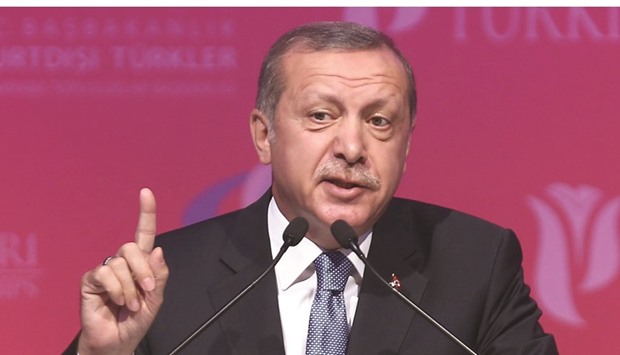President Recep Tayyip Erdogan said yesterday that he had “no respect” for a decision by Turkey’s top court to release two journalists held on charges of revealing state secrets, triggering accusations that he was trampling on the constitution.
The Constitutional Court – one of the few Turkish public institutions not fully under Erdogan’s control – had allowed the release of the Cumhuriyet newspaper’s editor-in-chief Can Dundar and Ankara bureau chief Erdem Gul after three months in jail.
“I don’t concur with the decision and I have no respect for it,” Erdogan told reporters before leaving on a week-long trip to Africa. “This issue is not remotely linked freedom of expression. It’s a spying case.”
Dundar and Gul walked out of jail in Istanbul before dawn on Friday after the court ruled their rights had been violated.
They had been detained since November over a report alleging that Erdogan’s government tried to deliver arms to Islamist rebels in Syria.
But the pair will still stand trial on the charges on March 25, with prosecutors demanding multiple life terms.
Cumhuriyet said that Erdogan’s comments were “like a threat” and the Turkish opposition lashed out furiously at his apparent lack of regard for judicial independence as enshrined in the constitution.
Ozgur Ozel, one of the leaders of the opposition Republican People’s Party (CHP), accused Erdogan of staging a “coup”.
“Today the president ... has tried to give instructions to the judiciary. The constitution has been trampled on today. It’s a situation of irresponsible abuse.”
Erdogan said that after almost 15 years of rule by his Justice and Development Party (AKP), media freedoms had reached an “ideal point”.
“I believe in defending freedom of expression until the end,” he said. “But I do not believe in using freedom of expression ... as a mask to attack to the country.”
Dundar and Gul have been formally charged with obtaining and revealing state secrets “for espionage purposes” and seeking to “violently” overthrow the government as well as aiding an “armed terrorist organisation”.
Erdogan added: “For me, there cannot be limitless media freedom. There is no absolute freedom for the media in any country in the world.”
The newspaper report had sparked a furore in Turkey, fuelling speculation about the government’s role in the Syrian conflict and its alleged dealings with Islamist rebels in Syria.
The Constitutional Court, Turkey’s top instance, is one of the very few public institutions in Turkey not controlled by Erdogan who enjoys the support of a loyal army, parliament and government.
Media reports said nine of the 12 judges who voted in favour of the journalists had been appointed during the rule of Erdogan’s predecessor Abdullah Gul, a former close ally now reportedly at odds with the president.
Two were appointed during the rule of Gul’s predecessor Ahmet Necdet Sezer and one was elected by parliament.
Of the three who said there had been no violation, one was appointed by Erdogan and two elected by parliament.

Erdogan: I don’t concur with the decision and I have no respect for it.
